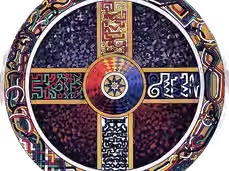The Wisdom of Imperfection
- Jun 15, 2015
- 3 min read
Updated: Dec 23, 2025

Many of us approach the spiritual life with an unspoken assumption that growth means improvement — becoming better, purer, or more complete versions of ourselves. Yet again and again, both spiritual tradition and lived experience suggest something more paradoxical: that our imperfection itself may be one of the primary places where transformation begins. Wisdom, it seems, does not arise from eliminating what is broken, but from learning how to live more truthfully, compassionately, and humbly within it.
Imperfection and the Spiritual Path
Rob Preece, a Buddhist spiritual mentor I am privileged to know, has written a book entitled The Wisdom of Imperfection. An excellent book understanding that, at heart, the spiritual journey involves encompassing all that we are, not a striving for a state of perfection, and encouraging us to have compassion on our vulnerability and fallibility as we travel our path.
But this is not a new idea, although it is one we have great need of continually revisiting. In the Christian tradition, St Thérèse of Lisieux (1873-1897), in her 'Little Way,' understood that we do not come to God by eliminating our imperfection, but by embracing it. Its gift is to make us more aware of our need for God’s mercy and love, and to keep us humble and open to God’s presence; not unsimilar sentiments to those in the well-known lines of Leonard Cohen: 'There is a crack in everything, that's where the light gets in.'
Brother Joe Schmidt describes Thérèse's method as, 'The way of being aware of your need for love, willing to give yourself to God's embrace like a child abandons itself with confidence and love into the arms of its loving parent, and then freely sharing love with others in creative good works of peace and justice. It is the willingness to be the person God calls you to be.'
What emerges here is not simply a more compassionate attitude toward ourselves, but a fundamentally different way of understanding transformation itself. The question becomes not whether imperfection belongs on the spiritual path, but how we relate to it — whether we struggle against it as an obstacle, or receive it as a teacher. It is at this point that two very different approaches to spirituality begin to reveal themselves.

Two Ways of Approaching Transformation
There are two broad approaches to spirituality — and, in Christian terms, to our understanding of conversion.
We can try and exclude and triumph over the negative parts - the shadow parts - of ourselves. However, this can lead to a kind of heroic spirituality based on will-power and the achievement of some sort of supposed perfection, although what we are often doing in reality is pretending, and quietly excluding the 'dark side' we don't want to look at.
The other way is that of 'integration' - of forgiving and accepting the imperfection and woundedness of life, including ourselves. This 'spirituality of imperfection' necessarily undermines the egoic use of religion for the purposes of our self-esteem. Such surrendering of superiority, or even the need for such superiority, is also central to any authentic enlightenment. Without it, we are blind (John 9: 39-41) and blind guides for others.
Wholeness, Paradox, and the True Self
In this understanding of the path, salvation is seen not as a divine transaction earned through moral perfection, but as a more organic unfolding, a becoming who we already are in our True Self in God, just like Thérèse's willingness to be the person God called her to be.

St Bonaventure (1217-1274) saw God as 'a circle whose centre is everywhere and whose circumference is nowhere.'
You fall into this wholeness when you stop denying or excluding things, even the imperfect, dark parts of yourself. It is when we allow these opposites to coexist, holding them within us in paradoxical balance, that we begin to find our wholeness and peace — our shalom.








































